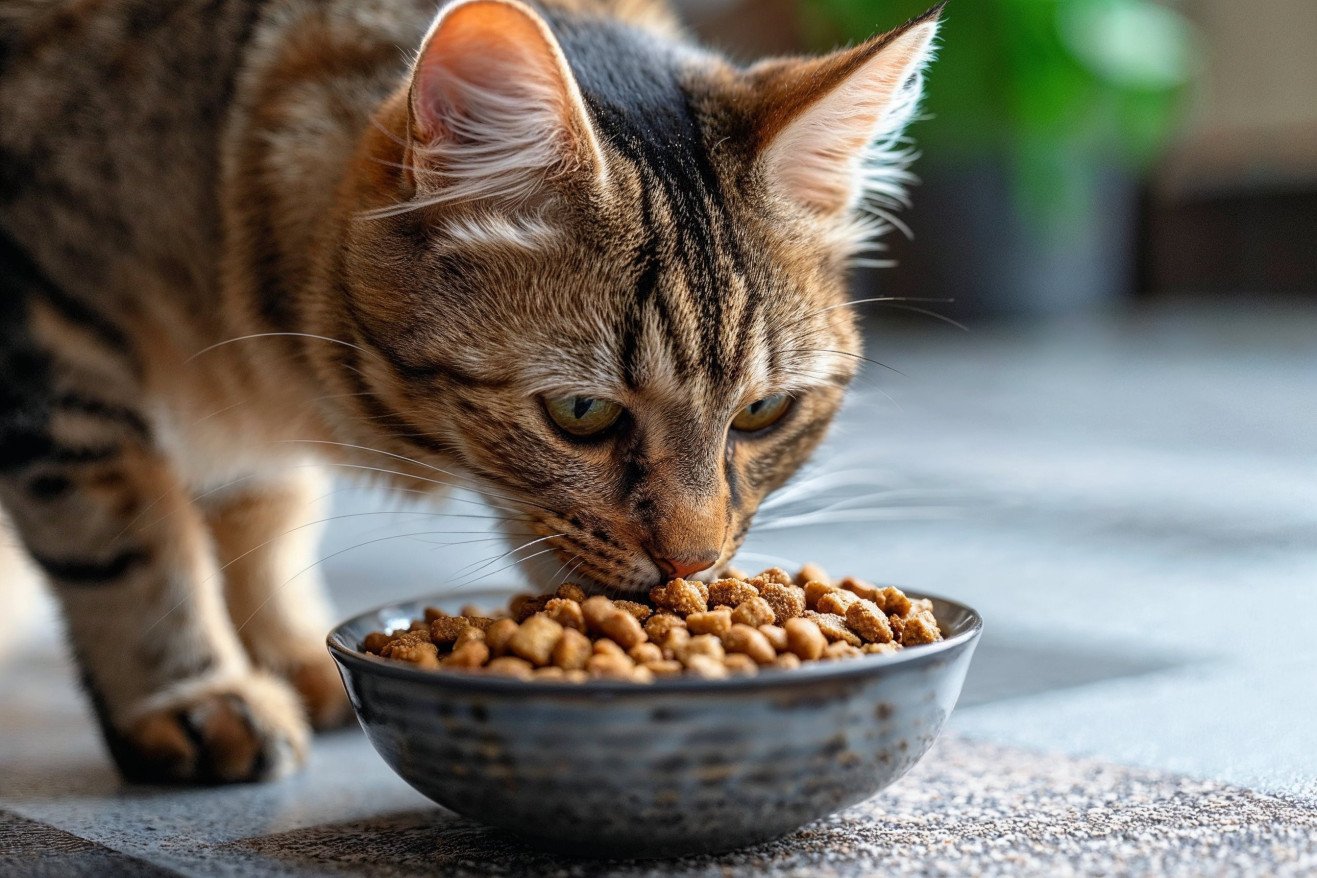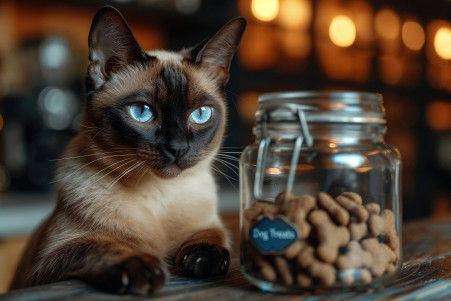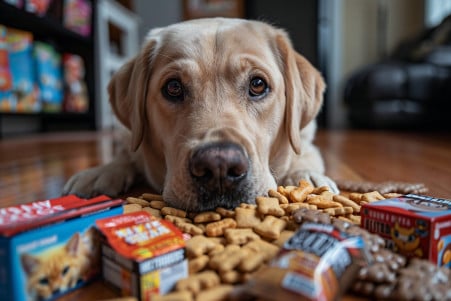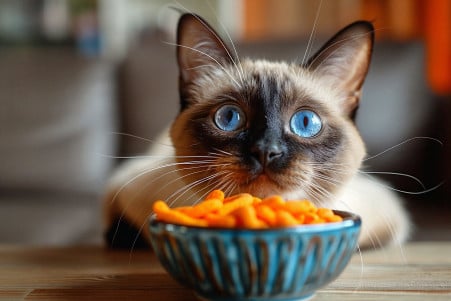Can Cats Eat Dog Food? Unveiling the Nutritional Truth
20 January 2024 • Updated 28 January 2024

If you’ve ever noticed your cat sneaking bites of your dog’s food, you may have wondered if it’s OK for them to eat it. While cats can eat dog food on an occasional basis, it is not nutritionally adequate for their regular diet. In fact, feeding your cat dog food can lead to nutritional deficiencies and other health problems because it lacks the essential nutrients taurine and arachidonic acid that cats need.
In this article, we’re going to take a deep dive into the world of pet nutrition by comparing the ingredients and nutritional content of cat and dog food using data from a variety of studies and information from sources like the Association of American Feed Control Officials (AAFCO). This information will help you better understand the potential nutritional consequences of cats eating dog food and why animal nutrition experts recommend species-appropriate diets for cats.
Can cats eat dog food without experiencing long-term health issues?
What Do Cats Eat? A Detailed Guide to Cat Nutrition
Knowing what your cat needs to eat is important. Cats have six essential nutrients: Protein, Fat, Carbohydrate, Vitamins, Minerals, and Water. Cats are obligate carnivores, so they need to get essential amino acids from animal-based protein in order to be healthy, which means protein is essential. In fact, cats need 11 essential amino acids, including taurine and arginine, which are required for their diet to support their overall health and well-being.
Water is also important for cats and is an essential nutrient. Cats are good at conserving water, but they still need to get a lot of it from their food, which is why wet food can be a great option.
The Association of American Feed Control Officials (AAFCO) has set standards for cat food to make sure it’s nutritionally complete and balanced, and it also has standards for different life stages, including growth and adult maintenance.
To avoid some of the most common feeding mistakes, make sure you’re not feeding your cat food that’s low in protein and that you’re not feeding them too much dry food, which can lead to dehydration.
PetMD also notes that it’s important to make sure you’re following AAFCO guidelines to avoid nutritional deficiencies. Cats need to eat food that’s formulated to meet their unique needs as obligate carnivores, and that’s why it’s important to avoid the problems that can come with improper feeding.
The Nutritional Gap: Why Cat Food Is Best for Cats
Cats are obligate carnivores, which means they need a diet that is high in animal protein to be healthy.
This is why cat food is formulated to have a higher animal protein content than dog food.
As a result, cat food is rich in amino acids such as taurine and arginine, which are considered essential for cats but are found in dog food in lower amounts.
The vitamin and mineral content of cat food also differs from that of dog food. For example, cat food contains more niacin and vitamin A than dog food, according to Paw CBD.
The AAFCO (Association of American Feed Control Officials) ensures that pet food is formulated to meet “complete and balanced” nutritional standards based on nutrient profiles.
When cat owners feed their pets dog food, they aren’t meeting their pets’ specific nutritional needs, which can lead to an imbalance of nutrients and even nutrient toxicity. This is why it’s important to know these differences, so we can make sure we’re meeting our cats’ nutritional needs and keeping them healthy since they can’t eat dog food and remain healthy.
The Risks of Cats Eating Dog Food
Even if it’s done occasionally, feeding cats dog food can have serious consequences. PetMD explains that one of the biggest risks is malnutrition because dog food doesn’t have the right nutrient profile for cats. Cats need a variety of essential nutrients that are not present in dog food or are not present in the right amounts.
One of the most important of these is taurine, an amino acid that’s found in cat food and is necessary for cats. Without it, cats can develop heart disease and vision problems, according to Daily Paws.
The effects of these nutrient imbalances can be long-term and severe. A taurine deficiency can cause retinal degeneration, which leads to blindness, and dilated cardiomyopathy, a heart condition that can be fatal. These problems show why it’s so important for cats to eat a diet that’s formulated specifically for their species and that supports all of their health needs.
The University of Missouri Small Animal Clinical Nutrition Service suggests using separate feeding stations or automatic feeders to help control access and prevent cats from eating dog food. This will help ensure that your cat gets the nutrients they need to be healthy and thrive.
What Is Taurine? A Key Nutrient for Cat Health
Taurine is an amino acid that contains sulfur and is essential in your cat’s diet. Cats are unable to make enough taurine in their bodies, so they need to get it from the food they eat, according to Dr. Jennifer Coates at PetMD. Taurine is necessary for a number of physiological processes, including vision, digestion, heart muscle function, and pregnancy.
Taurine deficiency can lead to serious health problems for cats, including central retinal degeneration and dilated cardiomyopathy (DCM), which is a heart condition. Cats.com explains that taurine deficiency can lead to irreversible blindness and life-threatening heart problems.
While commercial cat food is formulated to include enough taurine to prevent these problems, homemade and non-fortified diets can lead to taurine deficiency. This is why AAFCO guidelines are important for ensuring that cat food meets the nutritional needs of cats, including taurine.
Taurine deficiency can be diagnosed by a veterinarian, such as Dr. Michael Kearley at PetMD, through blood tests and specific heart and eye exams, and it can be treated with taurine supplements.
To make sure your cat gets enough taurine, it’s important to feed them animal-based proteins that are high in taurine, including muscle meat, heart, and organs. This will help ensure that your cat’s diet meets AAFCO standards, including the taurine levels that will help prevent these serious health issues and keep your cat healthy.
Feeding Furry Friends: What Science Says About Cat Diets
To sum up, cats’ nutritional requirements are very different from those of dogs, which shows that dog food is not a good option for cats to eat regularly. The lack of essential nutrients like taurine, arginine, and arachidonic acid in dog food can cause serious health problems in cats, including heart disease and blindness.
The need for water in cats’ diets and AAFCO’s influence on pet food regulations also show the importance of making sure that pet food is formulated specifically for the animal it’s intended for.
Being a good pet parent means more than just loving and caring for our pets; it means working with veterinarians to make sure that any dietary issues are addressed and that we’re meeting our cats’ nutritional requirements. Not only will following AAFCO standards help ensure that our pets are healthy, but it will also give us peace of mind.
Let’s make a commitment to continue learning about pet nutrition and health so that we can make sure our cats are as healthy as possible. In doing so, we’ll be able to nourish their lives and strengthen the bond we have with our beloved pets.


